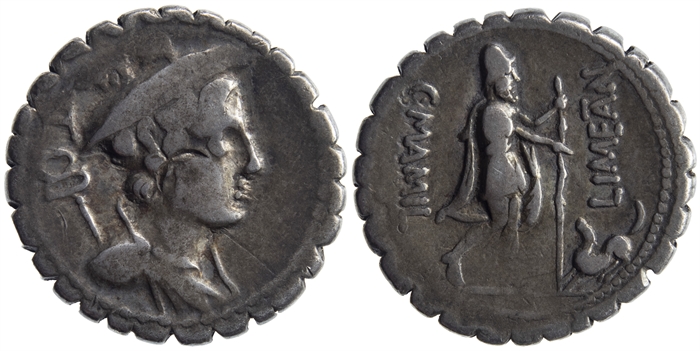MAGNIFICENT ROMAN COIN DEPICTING ODYSSEUS
ROMAN REPUBLIC. C. MAMILIUS LIMETANUS.
Serrate silver denarius.
Rome, minted in 82 BC.
20mm. 3.74 g. Avery nice specimen, with clear imprint and light rubbing.
Obverse: Draped bust of Mercury right, wearing winged petasos; caduceus and control letter behind.
Reverse: Ulysses standing right, holding staff in left hand and extending right hand to Argus; C•MAMIL to left, LIMETAN to right.
Crawford 362/1; BMCRR Rome 2725; RSC Mamilia 6.
A denarius of the Roman Republic featuring one of the very few references to Homer's Odyssey in ancient coinage. On the obverse is Mercury, a god very much propitious to Odysseus, easily recognizable by the winged petasos and the caduceus. The reverse depicts one of the most moving passages in literature, hardly matched to this day. In book XVII (290-327) Odysseus returns to Ithaca disguised as a beggar. His faithful dog, Argos, has been waiting for his return for 20 years. Ignored, abandoned by everyone, the dog is ridden with ticks and fleas, lying in a pile of manure. Odysseus is accompanied to the palace by Eumaeus the shepherd, who is unaware of the beggar's true identity. Odysseus recognizes his dog and is forced to hide a single tear that rolls down his cheek. He cannot greet the dog, as that would give away his identidy. Argos, after all those years, recognizes his master as well, but if he were to run to him it would most certainly cause his death by the suitors. Here Homer cannot do anything other than to end the life of Argos, otherwise the entire Odyssey would have been for naught. So Argos dies upon the vision of his master having fulfilled his life purpose: to await his return. It is also the moment that marks the end of the twenty year cycle since Odysseus left for the Trojan War, thus announcing the imminent closing of the Trojan Cycle itself. The denarius' reverse depicts the idealized moment of the scene where master and dog would be just about to meet and greet each other, but as we have seen, the reunion cannot happen. "There lay the hound Argos, full of vermin; yet even now, when he marked Odysseus standing near, he wagged his tail and dropped both his ears, but nearer to his master he had no longer strength to move. Then Odysseus looked aside and wiped away a tear. [...] But as for Argos, the fate of black death seized him straightway when he had seen Odysseus in the twentieth year." Mamilius Limetanus is one of the three moneyers for the year 82 BC. The moneyers, selected every year, were magistrates in charge of the production of coinage, and they were at liberty to determine the design of the coins, which were often deities and characters associated with their personal family history. Like most Roman Patricians, Limetanus claimed to be a descendant of a Homeric character, in this case, Odysseus—Julius Caesar's family, for example, thought themselves to be descendants of Aeneas. A wonderful specimen of this magnificent Roman denarius.
Order-nr.: 60369

